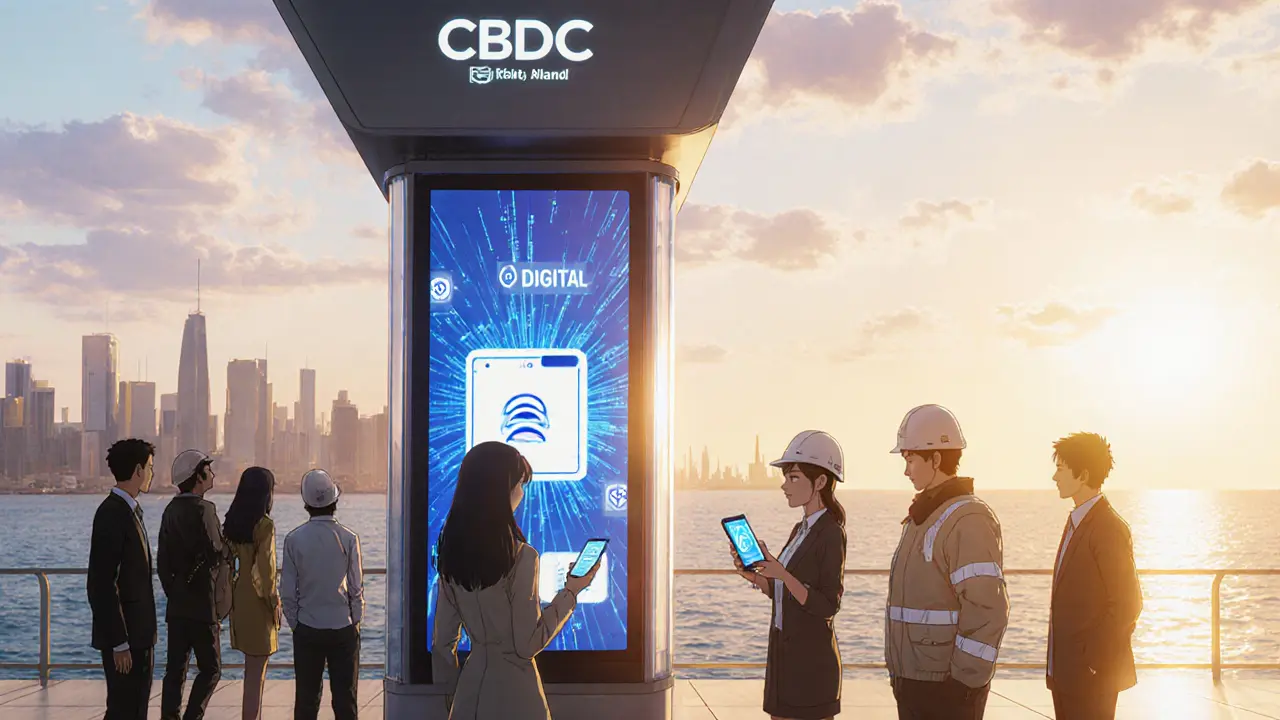Crypto Mining Profitability Calculator (Iran 2025)
Input Parameters
Results
Enter your mining parameters to see profitability calculations.
Note: These calculations assume you have an active mining license and agree to sell all output to the Central Bank of Iran at the current state-set price.
Ever wondered whether you can actually pay for a coffee, a rent invoice, or a freelance service using Bitcoin or any other crypto while you’re in Iran? The short answer is: it’s a legal gray zone wrapped in layers of control, surveillance, and occasional outright bans. The landscape changed dramatically between late 2024 and now, and understanding the current rules is crucial whether you’re a casual user, a business owner, or a miner trying to stay on the right side of the law.
Key Takeaways
- Domestic crypto‑to‑rial payments are effectively blocked; only government‑approved exchanges can convert crypto, and they must share full transaction data.
- Mining is legal with a license, but miners must sell their output to the Central Bank of Iran and obey strict electricity tariffs.
- Advertising, marketing, and public promotion of any cryptocurrency are banned nationwide.
- Using VPNs to access foreign exchanges is common but carries legal risk if caught.
- The upcoming digital rial (CBDC) will give the state a digital payment tool that bypasses all crypto‑related uncertainty.
Regulatory Landscape in 2025
Iran’s approach to digital assets has swung like a pendulum. In December 2024 the central bank shut down every online crypto‑to‑rial gateway, citing the rial’s free‑fall and sanctions‑evasion fears. Just a month later, in January 2025, the same authority opened a narrow, tightly‑controlled channel: only exchanges that use the government‑provided API can trade, and every transaction is logged in real time for the Central Bank of Iran. This shift from total prohibition to “controlled permission with full surveillance” is the core of today’s environment.
| Date | Action | Impact on Payments |
|---|---|---|
| 27 Dec 2024 | Blocked all crypto‑to‑rial web gateways | Zero legal on‑ramp for retail users |
| 02 Jan 2025 | Unblocked exchanges that use CBI API | Limited on‑ramp, full data sharing required |
| 15 Jan 2025 | Mandated licenses for every crypto platform | Only licensed operators can accept crypto payments |
| 10 Feb 2025 | Nationwide ban on crypto advertising | Public promotion illegal, drives activity underground |
| 20 Jun 2025 | Digital rial pilot on Kish Island launched | State‑issued CBDC begins to compete with crypto |
Payment Gateways, Licensing, and Data Access
If you want to convert crypto into Iranian rial, you must go through a licensed exchange-Nobitex being the most well‑known example. The licensing process involves:
- Submitting a detailed business plan to the Central Bank of Iran.
- Installing the government‑provided API that streams transaction logs in real time.
- Passing rigorous Know Your Customer (KYC) and Anti‑Money Laundering (AML) checks for every user.
Once approved, the exchange can act as a bridge, but it cannot allow peer‑to‑peer crypto payments for goods or services. Every conversion must flow through the central bank‑approved account, meaning you cannot simply hand a Bitcoin wallet to a shop owner and expect the transaction to go through.
What Is Actually Allowed?
While direct crypto payments are practically prohibited, the law does carve out a few permissible activities:
- Mining: Legal if you have a license from the Ministry of Industry, Mine and Trade and agree to sell all mined coins to the Central Bank of Iran at a state‑set price.
- Holding: Individuals can own crypto in personal wallets; the law does not criminalize possession, but any attempt to move those assets into the domestic payment system triggers oversight.
- Cross‑border transfers: Sending crypto out of Iran via VPN‑protected foreign exchanges is not explicitly illegal, though authorities monitor traffic and have frozen addresses linked to Iranian wallets (e.g., the July 2025 Tether freeze).

What’s Strictly Prohibited?
Understanding the red lines helps you avoid costly penalties:
- Any direct crypto‑to‑rial payment for commercial transactions inside Iran.
- Advertising, sponsorship, or public promotion of any cryptocurrency, including influencers posting on Instagram or Telegram.
- Operating an unlicensed exchange, broker, or payment gateway.
- Running mining rigs without the required license or using government‑set electricity tariffs.
Violations can lead to fines, confiscation of crypto assets, and, in extreme cases, criminal prosecution-especially if the activity is linked to sanctions evasion.
How Users Bypass Restrictions (And the Risks Involved)
Many Iranians resort to virtual private networks (VPNs) to reach foreign platforms like Binance, KuCoin, or local peer‑to‑peer forums. While this method bypasses the domestic gateway block, it introduces two major dangers:
- Legal exposure: Iranian law criminalizes the circumvention of state‑controlled financial channels. If authorities trace the VPN traffic, users can face charges for “unauthorized financial activity.”
- Security threats: Unregulated foreign exchanges may have weaker KYC procedures, making users vulnerable to scams, phishing, and asset freezes.
Because of these risks, most seasoned traders keep a minimal on‑chain footprint, converting crypto to rial only through a licensed exchange and pulling the fiat out of the country via official banking channels.
Sanctions, International Pressure, and the IRGC Factor
Iran first turned to crypto in 2017 as a way to dodge U.S. and EU sanctions that cut off its access to the global banking system. The Islamic Revolutionary Guard Corps (IRGC) has reportedly used crypto wallets to move funds, prompting a wave of international compliance actions. In July 2025, Tether froze dozens of Iranian‑linked addresses, highlighting how external actors can disrupt local crypto activity.
These sanctions‑related dynamics push the state to keep a tight grip on domestic crypto flows while still allowing mining for state revenue. The balance is delicate: too much freedom could undermine the rial; too much restriction could drive the market entirely underground.

Future Outlook: Digital Rial (CBDC) and Its Implications
The digital rial (sometimes called “Rial Currency”) is Iran’s answer to both crypto‑related uncertainty and the need for a modern payment system. Launched as a pilot on Kish Island in mid‑2025, the CBDC aims to:
- Provide a state‑backed digital payment method that bypasses the need for foreign crypto.
- Enable instant, traceable transactions, satisfying the government’s demand for full oversight.
- Reduce reliance on the volatile fiat rial by offering a more stable electronic counterpart.
For businesses, the digital rial could become the only legal digital payment tool, effectively closing the remaining loophole for crypto‑based payments. Until the CBDC is nationwide, the current crypto restrictions remain.
Checklist for Anyone Considering Crypto Payments in Iran (2025)
- Identify your use case: Are you mining, holding, or trying to pay for a service?
- Secure a license if you mine: Apply through the Ministry of Industry, Mine and Trade and agree to sell output to the Central Bank of Iran.
- Use only government‑approved exchanges for conversion: Verify that the platform uses the CBI API and has a valid license.
- Never advertise crypto: Even a casual social‑media mention can be deemed a violation.
- Consider the digital rial: Keep an eye on the rollout schedule; it may soon replace crypto for everyday transactions.
- Maintain records: Keep screenshots of KYC approvals and transaction logs to prove compliance if questioned.
Following these steps won’t guarantee you’ll never run into trouble, but it drastically reduces your risk of a surprise fine or asset freeze.
Frequently Asked Questions
Can I pay a local shop in Iran with Bitcoin?
No. The law blocks any direct crypto‑to‑rial payment for goods or services. Payments must go through a licensed exchange that routes the conversion to the Central Bank of Iran, which makes peer‑to‑peer crypto payments effectively illegal.
Is it legal to own Bitcoin in my personal wallet?
Yes, mere possession isn’t criminalized. Problems arise if you try to move the coins into the domestic payment system without using a licensed gateway.
What happens if I use a VPN to access a foreign exchange?
Using a VPN to bypass state‑controlled gateways is considered circumvention, which can lead to fines or prosecution if authorities trace the activity. It also exposes you to security risks on unregulated platforms.
How does the digital rial differ from Bitcoin?
The digital rial is a Central Bank Digital Currency (CBDC) issued and fully controlled by the Central Bank of Iran. Unlike Bitcoin, it isn’t mined, its supply is set by the bank, and every transaction is recorded on a state‑run ledger, ensuring complete oversight.
Will crypto mining remain profitable in Iran?
Mining is legal with a license, but miners must sell output to the central bank at a state‑determined price and pay high electricity tariffs. For many, the economics have become negative, pushing a large share of operations underground.


Marina Campenni
May 3, 2025 AT 11:00I appreciate the thorough overview of the current crypto landscape in Iran. The balance between licensing and surveillance is clearly a delicate one, and anyone considering participation should keep detailed records. Staying within the legal framework helps avoid unexpected fines or asset freezes.
Irish Mae Lariosa
May 4, 2025 AT 14:47The shift from an outright ban to a tightly‑controlled gateway, as described in the timeline, illustrates how the Iranian authorities are attempting to harness digital assets without relinquishing oversight. By mandating that every exchange integrates the Central Bank’s API, the state ensures a real‑time audit trail for each transaction, effectively neutralising the anonymity that many users seek. This approach, while technically feasible, creates a substantial compliance burden for legitimate operators, who must align their internal KYC procedures with state‑mandated standards. Moreover, the requirement to log each trade in a centralized ledger introduces a single point of failure that could be exploited for political or economic leverage. The licensing process, which involves submitting detailed business plans, is not merely bureaucratic; it acts as a gate‑keeping mechanism to filter out entities that may not align with national interests. For miners, the obligation to sell all output to the Central Bank at a state‑determined price fundamentally transforms mining from a profit‑driven activity into a revenue source for the government. This policy, combined with elevated electricity tariffs, has already pushed many underground operators to the margins. The ban on advertising further exacerbates the information vacuum, forcing enthusiasts to rely on private channels that are harder to monitor but also riskier. While the use of VPNs to access foreign exchanges remains common, the legal exposure tied to “circumvention” carries severe penalties that can include both financial sanctions and criminal prosecution. The digital rial pilot on Kish Island signals a strategic pivot towards a state‑issued CBDC that could eventually render private cryptocurrencies obsolete for everyday transactions. In practice, this means that businesses will soon have to adapt to a single, government‑controlled digital payment method, narrowing the space for crypto‑based commerce. Internationally, the Tether freezes of July 2025 demonstrate how external actors can intervene, adding another layer of uncertainty for Iranian crypto users. The combined effect of these regulations is a marketplace that operates under heavy surveillance, limited liquidity, and a looming threat of further restrictions. For anyone contemplating crypto payments, the safest route remains through a licensed exchange that fully complies with the Central Bank’s data‑sharing requirements. Ignoring these protocols not only jeopardises personal assets but also risks entanglement in broader geopolitical disputes. Ultimately, the evolving framework reflects Iran’s attempt to balance technological adoption with sovereignty concerns, and staying informed is the best defense against unintended violations.
Nick O'Connor
May 5, 2025 AT 18:34When analysing the current regulatory framework, it becomes evident that the Central Bank's API requirement, the licensing mandates, and the real‑time transaction logging, all serve a unified purpose: comprehensive state oversight; however, the practical implications for everyday users, especially those without institutional support, remain challenging, particularly regarding compliance costs, operational risk, and the potential for inadvertent violations.
David Moss
May 6, 2025 AT 22:20What they dont tell you is that every time you log a trade the state can see the pattern and use it to control the economy they are basically building a digital prison for money and anyone who tries to bypass it with a vpn is just screaming for trouble they are watching everything
Vinoth Raja
May 8, 2025 AT 02:07From a systems‑theoretic perspective, the imposition of a centralized ledger effectively reduces the entropy of the transaction space, aligning it with the state's macro‑economic control loops; nevertheless, the emergent behaviour of underground peer‑to‑peer networks can be modelled as a complex adaptive system that self‑organises around the constraints imposed by regulatory vectors.
Kaitlyn Zimmerman
May 9, 2025 AT 05:54For anyone looking to stay compliant, the easiest path is to register with a licensed exchange that already uses the CBI API, keep your KYC documents handy, and avoid any public discussion of crypto on social platforms; this simple checklist will keep you well within the legal boundaries and minimise the risk of unexpected penalties.
DeAnna Brown
May 10, 2025 AT 09:40Honestly, the whole crypto saga in Iran feels like a blockbuster movie where the villains are the regulators and the heroes are brave traders trying to survive; we all know the script, but you still have to watch the show! The digital rial might be the next big thing, but until it’s nationwide, crypto will keep dancing in the shadows, and that’s just the way it goes.
Chris Morano
May 11, 2025 AT 13:27Staying optimistic while navigating these rules can actually keep you safe.
Ikenna Okonkwo
May 12, 2025 AT 17:14It is encouraging to see that, despite strict oversight, there remains a space for legitimate mining operations that contribute to the national grid; the key is securing the proper license and adhering to the mandated electricity tariffs, which, though burdensome, provide a clear legal pathway. Moreover, the gradual rollout of the digital rial could unify payment standards, making cross‑border transactions smoother for businesses that have been waiting for a reliable digital infrastructure.
Shikhar Shukla
May 13, 2025 AT 21:00While the author presents a comprehensive overview, one must note that the analysis omits the potential impact of international sanctions on the feasibility of maintaining licensed exchanges, and fails to address the legal ambiguities surrounding cross‑border crypto flows, which are critical factors for any rigorous assessment of Iran’s digital asset policy.
Matthew Theuma
May 15, 2025 AT 00:47Just chilling on the sidelines, watching the whole thing unfold 😎. It’s wild how the state is trying to own every transaction, yet people still find ways to move value. Keep your eyes open and your wallets secure!
Carolyn Pritchett
May 16, 2025 AT 04:34The post totally sugar‑coats what is basically a massive government overreach; anyone thinking they can safely use crypto here is delusional. The penalties are real, the surveillance is ruthless, and the whole “digital rial” hype is just a distraction from the underlying oppression.
Jason Zila
May 17, 2025 AT 08:20By following the licensing steps and using only approved platforms, individuals can avoid the pitfalls that many overlook, ensuring that their crypto activities remain within the legal framework and protect them from unnecessary scrutiny.
Cecilia Cecilia
May 18, 2025 AT 12:07The guidance provided is clear; compliance with licensed exchanges and avoidance of public promotion are essential for lawful participation.